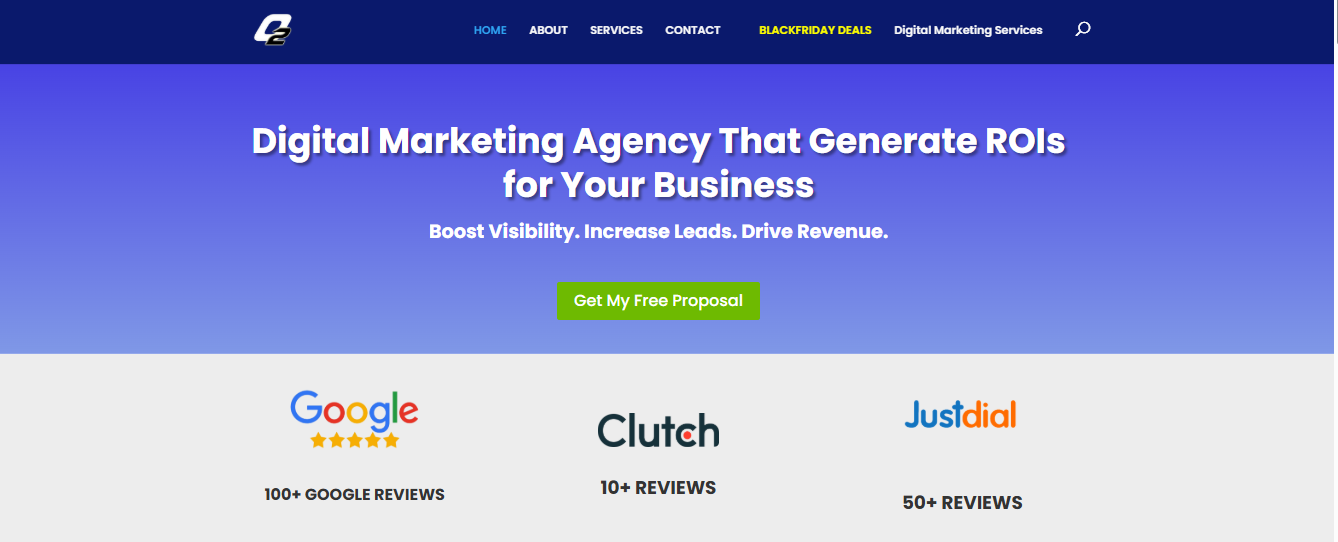
by Shashikanth Heerekar | Jan 31, 2026 | Digital Marketing, SEO News
Discover the top web designing companies in Hyderabad offering website design, development, SEO, digital marketing, PPC, and branding solutions for business growth.
Introduction
Hyderabad has become one of India’s fastest-growing digital and technology-driven cities, making it a preferred destination for businesses seeking professional web design and digital marketing services.
With a strong ecosystem of IT talent, creative professionals, and innovative agencies, the city offers end-to-end solutions that help brands build and scale their online presence. Today, a well-designed website is more than an online brochure; it is a powerful business tool that drives visibility, engagement, and conversions when paired with the right digital marketing strategies.
Web designing companies in Hyderabad serve a wide range of industries by delivering visually appealing, user-friendly, and performance-oriented websites.
These companies also offer digital marketing services such as search engine optimization, social media marketing, and paid advertising to help businesses reach the right audience at the right time.
Whether building a brand from scratch, redesigning a website, or launching targeted digital campaigns, Hyderabad-based agencies offer comprehensive solutions tailored to diverse business goals.
Oxygen

OXYGEN
Oxygenites is a leading web design and digital marketing company with over 13 years of experience.
Oxygenites provides a full range of services, including website design and development, search engine optimization (SEO), social media marketing, pay-per-click (PPC) advertising, content writing, video production, reputation management, conversion management, and Amazon marketing.
Their holistic approach ensures every website is visually strong and optimized for traffic, engagement, and lead generation.
Oxygenites stands out for its focus on delivering measurable business outcomes. By combining creative design, technical expertise, and data-driven digital marketing strategies, the company helps brands strengthen their online presence and achieve consistent growth.
This commitment to quality and performance has made Oxygenites a trusted name among top web design companies in Hyderabad
Contact details
Phone: 9885346295
Email: [email protected]
Website: https://oxygenites.com/
DigitalZap

DigitalZap is a leading company in Hyderabad offering professional web design services to help businesses build strong and visually appealing online platforms.
The company provides website designing and development services focused on creating user-friendly, responsive, and business-oriented websites that enhance brand presence.
Along with web designing, DigitalZap also offers search engine marketing, marketplace marketing, app marketing, and branding services in Hyderabad, helping businesses strengthen their identity and reach their target audience effectively.
Their integrated approach ensures businesses have a well-designed website supported by strategic marketing and branding solutions for overall digital growth.
Contact details
Phone: 7331122663
Email: [email protected]
Website: https://digitalzap.in/
Nexonweb

Nexonweb
Nexonweb is a technology-driven company that delivers a broad range of digital and development solutions to support modern business needs.
The company provides web and mobile app development and offshore development to help organizations build scalable and reliable digital platforms.
Its expertise also includes AI and ML development, IoT development, and blockchain development, enabling businesses to adopt advanced technologies.
Nexonweb also offers e-commerce solutions and mobile app development to create seamless digital experiences across devices. The company provides digital marketing services to support online visibility and business growth through strategic digital initiatives.
Contact details
Phone: +91-9063 630795
Email: [email protected]
Website: https://nexonweb.com/
Conclusion
Hyderabad has become a leading destination for web designing and digital marketing services, offering businesses access to skilled professionals, innovative technology, and cost-effective solutions.
From website design and development to SEO, social media marketing, PPC, content creation, and conversion optimization, web design companies in Hyderabad provide end-to-end services that help brands build a strong online presence.
Whether you are a startup launching your first website or an established business aiming to enhance digital performance, choosing the right web design company in Hyderabad can drive long-term growth and measurable results.
With their focus on user experience, search visibility, and data-driven strategies, these agencies play a vital role in helping businesses stay competitive in today’s digital landscape.
FAQS
1. What services do web design companies in Hyderabad offer?
Most web design companies in Hyderabad offer website design and development, search engine optimization (SEO), social media marketing, pay-per-click (PPC) advertising, content writing, video production, reputation management, conversion optimization, and Amazon marketing services.
2. Do web design companies in Hyderabad also provide digital marketing
services?
Yes, many web design companies in Hyderabad provide complete digital marketing services, including SEO, social media marketing, PPC campaigns, content marketing, and online reputation management to help businesses grow online.
3. How long does it take to design and develop a website?
The timeline depends on the scope of the project. A basic website may take 2–4 weeks, while advanced or eCommerce websites can take 6–8 weeks or longer, depending on design and development requirements.
4. Do web design companies help with conversion optimization?
Yes, conversion management is a key service offered by many agencies. This includes improving website layout, call-to-action placement, page speed, and user journey to increase leads and sales.
5. How do I choose the best web design company in Hyderabad?
To choose the best company, review their portfolio, services offered, client testimonials, industry experience, pricing transparency, and ability to provide end-to-end digital marketing solutions.

by Shashikanth Heerekar | Dec 31, 2025 | SEO News
Search for everywhere optimization for dental clinics is a digital marketing strategy that focuses on making a clinic visible across all platforms where patients search. This includes Google Search, Google Maps, voice search, social media platforms, AI-powered search tools, and local business directories. When done correctly, this approach helps clinics appear wherever patients are looking, not just on Google.
Many dental clinics choose the best dental SEO company to manage this process because it requires proper research, technical knowledge, and continuous monitoring to achieve long-term results.
What Is Search Everywhere Optimization for Dental Clinics?
Search everywhere optimization means optimizing a dental clinic’s online presence so it can be found on every search platform, not only on websites.
Platforms Covered:
- Google Search
- Google Maps
- Voice search (mobile assistants)
- Social media search
- AI-based search tools
- Local business directories
Example:
A patient searches “dentist near me” on Google Maps, asks a voice assistant for a nearby dentist, or searches on social media. Search everywhere optimization ensures your clinic appears in all these places.
Why Dental Clinics Need Search Everywhere Optimization
Patients no longer search in just one place. They use different platforms depending on convenience.
Benefits for Dental Clinics:
- Increased visibility across platforms
- Better trust and credibility
- Higher website traffic
- More appointment bookings
This is why working with the best dental SEO company becomes important for clinics that want consistent growth.
Step-by-Step: How to Do Search for Everywhere Optimization for Dental Clinic
Dental Patient Search Behaviour Analysis
Before starting any optimization, dental clinics must understand how patients search for dental services online. This includes knowing the words they use, the platforms they prefer, and the type of dental problems they search for, so the clinic can appear at the right place and time.
This includes:
- What keywords patients use
- Which platforms they prefer
- When they search for dental services
Example:
Some patients search for “emergency dentist near me”, while others look for “braces specialist” on social media.
Google Maps Keyword Research for Dentists
Google Maps plays a major role in helping local patients find nearby dental clinics. By researching the right location-based and “near me” keywords, dentists can improve their map rankings and attract patients who are actively looking for dental services in their area.
What to Research:
- “Near me” keywords
- Location-based service keywords
- Emergency and specialty dental searches
Example:
Instead of targeting only “dentist,” optimize for “dental clinic near Jubilee Hills.”
Supporting Long-Tail Keywords
Long-tail keywords are longer and more specific search terms that patients use when they are close to booking a dental appointment. These keywords usually have less competition and help dental clinics attract highly targeted visitors who are more likely to become patients.
Why They Matter:
- Lower competition
- Higher conversion rate
- Better match with patient intent
Example:
“Affordable pediatric dentist near me” converts better than “dentist.”
Optimize Your Google Business Profile
Your Google Business Profile is essential for improving search everywhere visibility and attracting local patients. Keeping your profile updated with accurate details, services, photos, and reviews helps your dental clinic appear more often in Google Search and Google Maps results
Optimization Steps:
- Accurate clinic name, address, and phone number
- Updated clinic timings
- Service descriptions
- Regular posts and images
Example:
A complete and active profile ranks higher on Google Maps and attracts more calls.

Structured Data for Dental Clinics
Structured data helps search engines clearly understand your dental clinic’s important details, such as services, location, contact information, and reviews. This makes it easier for your clinic to appear in rich search results and improves visibility across different search platforms.
What It Includes:
- Clinic address
- Services offered
- Reviews and ratings
- Appointment information
This improves visibility in rich search results and AI-powered platforms.
Convert Website Visitors Into Dental Patients
Getting website traffic alone is not enough; visitors need to be encouraged to take action. By having clear appointment buttons, easy contact forms, and trust-building elements like reviews and certifications, dental clinics can turn online visitors into real patients.
Conversion Improvements:
- Clear “Book Appointment” buttons
- Easy contact forms
- Trust signals like reviews and certifications
Example:
A patient is more likely to book when reviews and contact options are visible.
Increase Dental Clinic Appointments Online
Increase Dental Clinic Appointments Online
Search everywhere optimization helps dental clinics reach patients across multiple platforms, making it easier for them to find and contact the clinic. By improving visibility on Google, Maps, social media, and other channels, clinics can significantly increase online appointment bookings.
How It Helps:
- Reaches patients across platforms
- Builds trust before clinic visits
- Makes booking simple and fast
This is where many clinics rely on the best dental SEO company to connect strategy with results.
Conclusion
Search everywhere optimization is no longer optional for dental clinics. Patients search across Google, Maps, voice tools, social platforms, and AI search systems. By understanding patient search behavior, researching the right keywords, optimizing Google Business Profiles, using structured data, and improving conversions, dental clinics can increase visibility and appointments. Clinics that partner with the best dental SEO company gain a competitive advantage by appearing wherever patients search.
Frequently Asked Questions (FAQs)
1. What does search everywhere optimization mean for dental clinics?
It means optimizing a clinic’s presence across all platforms where patients search, not just Google websites.
2. Is Google Maps important for dental clinics?
Yes. Most local patients discover clinics through Google Maps when searching for nearby services.
3. How does patient search behavior help SEO?
It helps clinics understand what patients want and where they search, allowing better keyword targeting.
4. Can search everywhere optimization increase appointments?
Yes. It improves visibility and trust, which leads to more calls and online bookings.
5. Do small dental clinics need search everywhere optimization?
Absolutely. It helps small clinics compete with larger practices by appearing in local and multi-platform searches.

by Shashikanth Heerekar | Dec 31, 2025 | SEO News
Introduction
SEO services enable dental clinics to attract patients searching for dental care online. Most people use Google to find local dentists, compare treatments, read reviews, and book appointments.
If your clinic does not appear in search results, patients will likely choose another provider.
An effective SEO strategy increases online visibility, builds trust, and generates consistent appointment requests. Unlike paid ads that end when the budget is exhausted, SEO supports long-term growth.
When implemented correctly, SEO is one of the most reliable ways to attract new patients. It involves optimizing your clinic’s website, content, and local listings to improve search engine visibility. The goal is to ensure search engines clearly understand your services, expertise, and service areas.
These services typically include:
- Keyword research based on patient search behavior
- Website optimization (technical SEO)
- Content creation and service page optimization
- Local SEO and Google Business Profile optimization
- Reputation and review management
By addressing patient needs and ensuring your website is user-friendly, dental SEO attracts individuals ready to book appointments.
For example, when someone in your area searches for “best dentist near me” or “tooth pain treatment in Hyderabad,” your clinic’s website can appear on the first page of Google.
Why SEO Is Important for Dental Clinics
Patients search online using phrases like:
- “dentist near me”
- “emergency tooth pain treatment”
- “best dental clinic in [city]”
SEO ensures your clinic appears in these key searches. Higher rankings increase patient trust and the likelihood they will choose your services.
SEO also builds authority over time. A well-optimized website demonstrates professionalism, reliability, and expertise, which are essential in healthcare decisions.
For example, if someone has sudden tooth pain and searches for “emergency dentist near me,” your clinic can appear at the top of the results.
Matching Patient Search Intent
Good dental SEO starts with understanding how patients search. Most people use everyday words to describe their symptoms. For example, they might search for “bleeding gums treatment” instead of “periodontal therapy.”
When you create content that answers real patient questions, your clinic becomes more useful to both people and search engines. Pages built around patient questions tend to rank higher.
Adding FAQs, educational blogs, and detailed service explanations improves engagement and increases the chances of ranking in featured snippets.
For example, instead of just using the term “periodontal therapy,” you could add a page called “Why Are My Gums Bleeding?” that explains the causes and treatment options in simple terms.
Local SEO for Dental Practices
Local SEO is very important for dental clinics because most patients want a dentist close to home. Optimizing for local searches helps more people in your area find you.
Key local SEO strategies include:
- Optimizing your Google Business Profile
- Maintaining consistent Name, Address, Phone (NAP) details
- Collecting and responding to patient reviews
- Creating location-specific service pages
Clinics that show up in Google Maps get more direct calls and appointment bookings than those that do not focus on local SEO.
For example, if someone searches for “dental clinic near me” on Google, your clinic can appear at the top of Google Maps with your address, phone number, and patient reviews.
Website Optimization and Technical SEO
Google favors websites that are easy and quick to use. A dental website should be:
- Mobile-friendly
- Fast-loading
- Secure (HTTPS enabled)
- Easy to navigate
Having clear service pages, good headings, and helpful links makes it easier for search engines to understand your site. Technical fixes like compressing images and using simple URLs help your site load faster and keep visitors from leaving.
A well-optimized website not only ranks higher but also helps patients trust your clinic.
For example, if a patient visits your website on their phone and it loads fast, looks good, and makes it easy to find the “Book Appointment” button, they are more likely to reach out.
Building Trust and Authority (EEAT)
Google evaluates healthcare content based on Experience, Expertise, Authoritativeness, and Trustworthiness (EEAT). Dental websites must demonstrate credibility.
Ways to strengthen authority:
- Detailed dentist profiles with qualifications
- Transparent service explanations
- Educational, medically accurate content
- Patient testimonials and case studies
- Secure website with privacy policy
High-quality content that genuinely helps users performs better than keyword-heavy pages. Trust signals have a direct impact on ranking stability.
For example, when a patient visits your website and sees the dentist’s qualifications, years of experience, patient testimonials, and clear treatment explanations, they are more likely to feel confident in your clinic.
Long-Term Growth Through SEO
SEO is a long-term strategy. While results may take three to six months to become noticeable, growth is steady and sustainable.
Unlike paid advertising, organic rankings continue to generate traffic without additional marketing costs. Over time, consistent optimization builds domain authority and reduces reliance on ads.
Clinics that invest in structured SEO see continuous improvement in visibility, inquiries, and patient trust.
For example, after consistently optimizing your website for several months, your clinic may begin ranking for keywords like “family dentist in your city,” resulting in regular appointment calls each week.
Benefits of SEO Services for Dental Practices
A well-executed SEO strategy delivers:
- Increased organic visibility
- Higher-quality patient leads
- Stronger local presence
- Greater online credibility
- Reduced reliance on paid advertising
When properly implemented, SEO serves as a cost-effective and predictable marketing channel for dental clinics.
For example, when your clinic ranks on the first page for searches like “best dentist near me,” more patients find your website without relying on ads.
Conclusion
SEO services for dental practices offer a reliable path to sustainable growth. By focusing on patient intent, local optimization, technical performance, and high-quality content, dental clinics can consistently attract new patients online.
Adhering to ethical and Google-compliant SEO practices ensures long-term ranking stability and protects your website from algorithm penalties. With the right strategy, your dental practice can convert search traffic into lasting patient relationships.
In today’s competitive healthcare market, investing in professional SEO is essential for consistent visibility. A well-optimized website builds trust, strengthens your online reputation, and enhances patient engagement.
FAQ’S
1. What are SEO services for dental practices?
ans. SEO services for dental practices help clinics improve their visibility on search engines like Google. These services include website optimization, content creation, keyword targeting, and local SEO strategies. The goal is to attract patients who are actively searching for dental treatments online and convert them into appointments.
2. Why is SEO important for dental clinics?
ans. SEO is important because most patients search online before choosing a dentist. Ranking higher in search results increases visibility, builds credibility, and drives qualified patient inquiries. Unlike paid ads, SEO delivers long-term organic traffic and sustainable growth.
3. How long does it take for dental SEO to show results?
ans. Most dental clinics start seeing measurable improvements within 3 to 6 months. However, results depend on competition, website condition, and the quality of SEO implementation. Consistent optimization leads to stronger and more stable rankings over time.
4. What is local SEO for dentists?
ans. Local SEO focuses on helping dental clinics appear in location-based searches such as “dentist near me” or “best dentist in [city].” It includes optimizing your Google Business Profile, managing reviews, maintaining accurate contact details, and creating location-specific content. Strong local SEO increases visibility in Google Maps results.
5. Do dental practices need a blog for SEO?
ans. Yes, blogging helps dental websites rank for informational and symptom-based searches. Educational articles answer common patient questions and improve trust. Regular blog updates also signal freshness and authority to search engines.

by Shashikanth Heerekar | Dec 31, 2025 | SEO News
Introduction
SEO for dental clinics helps dentists connect with patients who actively search online for dental care. As patient behavior increasingly shifts toward digital search, organic visibility has become essential for clinic growth. This blog explains how SEO services for dentist improve discoverability, build trust, and support consistent appointment bookings over time.
When patients experience dental discomfort or need routine care, they rely on search engines to find reliable options nearby. Clinics that invest in SEO for dental clinics are better positioned to appear during these high-intent searches and guide patients toward informed decisions.
Understanding SEO for Dental Clinics
SEO services for dentist focus on improving a clinic’s online presence so search engines and users clearly understand its services, location, and credibility. These services include website optimization, content alignment, and local relevance strategies that work together to improve rankings organically.
Unlike generic SEO, SEO services for dental practices are built around patient behavior and healthcare trust. The goal is not just traffic but meaningful visibility that leads to calls, inquiries, and long-term patient relationships. Clinics that apply SEO consistently benefit from steady growth rather than short-term spikes.
Example:
A dental clinic that clearly explains its treatments and location on its website becomes more visible when patients search for nearby dental care, resulting in higher-quality inquiries.

The line graph shows Dental SEO driving steady, month‑on‑month growth in patient inquiries, while Generic SEO declines over time with short‑term spikes only.
How SEO for Dental Clinics Matches Patient Search Intent
SEO for dental clinics is designed around real patient search patterns. Most patients search using symptoms, urgency, or proximity rather than technical terms. SEO services for dentist align website content with these natural queries, making clinics more relevant during critical decision moments.
Patients rarely choose a clinic after one search. They compare options, read information, and look for reassurance. Consistent visibility across search results builds familiarity and trust, increasing the likelihood of contact.
Example:
A page explaining common tooth pain symptoms and when to visit a dentist helps patients understand urgency and confidently reach out for care.
Local Visibility Through SEO for Dental Clinics
Local visibility is one of the strongest ranking factors for dental clinics. SEO services for dentist strengthen location signals so clinics appear in nearby searches and map results. Dentist local SEO ensures accurate business details, relevant local content, and consistent engagement signals.
Many users search phrases similar to “dental SEO marketing near me,” which shows immediate intent. Clinics optimized for local visibility receive more calls, especially from patients seeking timely care.
Example:
A clinic that appears prominently in map listings receives more direct phone calls than clinics ranking lower in local results.

The pie chart shows most demand comes from Immediate Care (45%), followed by Routine Check‑ups (30%), highlighting high-intent patients as the primary audience.
Website Optimization in SEO for Dental Clinics
SEO for dental clinics also includes optimizing website performance and usability. Patients expect fast-loading, mobile-friendly websites with clear navigation. This focuses on improving page speed, layout clarity, and accessibility.
Search engines favor websites that offer a positive user experience. A well-optimized site keeps visitors engaged longer, supports better rankings, and improves conversion rates.
Example:
A mobile-optimized website with easy contact options increases same-day appointment requests from patients searching on their phones.
Content Role in SEO Services for Dentist
Content plays a vital role in building trust and authority. It prioritizes clear, educational content that answers patient questions accurately and responsibly. This approach aligns with practices commonly followed by the best dental SEO company, emphasizing long-term credibility over aggressive tactics.
Consistent content helps clinics remain relevant in search results and supports patient education, which is essential in healthcare decision-making.
Example:
An informative article explaining dental pain causes and treatment options attracts organic traffic and reassures potential patients.
Conclusion
SEO for dental clinics is a long-term strategy that supports sustainable patient growth. By investing in SEO services for dentist and SEO services for dental practices, clinics improve visibility, trust, and consistency in patient acquisition. When SEO is implemented ethically and strategically, it transforms online searches into lasting patient relationships.
Frequently Asked Questions (FAQs)
What is SEO for Dental Clinics?
SEO for dental clinics refers to optimizing a dental clinic’s online presence so it appears higher in search engine results when patients look for dental care.
Why is SEO for dental clinics important?
SEO for dental clinics ensures practices appear when patients search for dental care, improving trust, awareness, and appointment opportunities.
How does dentist local SEO help clinics?
Local SEO for dentists improves visibility in nearby searches and map results, helping clinics reach patients within their service area.
Is SEO better than paid ads for dentists?
SEO provides long-term visibility and consistent traffic without continuous advertising costs, making it a sustainable growth strategy.

by Shashikanth Heerekar | Dec 31, 2025 | SEO News
Introduction
Choosing the best dental SEO company is one of the smartest decisions a dental clinic can make in today’s competitive digital world. Patients now search on Google before visiting a dentist, and clinics that appear at the top get more visibility, trust, and appointments. A professional dental SEO company understands how to design, optimize, and promote a website in a way that Google prefers, helping clinics attract the right patients consistently.

SEO is no longer optional. Almost every business operates online with a dedicated website, and dental clinics are no different. When SEO is done correctly, it improves website rankings, increases traffic, and converts visitors into real patients who book appointments online or visit the clinic directly.
Why Choosing the Best Dental SEO Company Matters
The best dental SEO company brings extensive experience, proven strategies, and deep knowledge of how search engines work. Dental SEO is different from general SEO because it focuses on local searches, patient intent, and trust-building.
Example
When a patient searches for “dentist near me” or “teeth cleaning clinic,” Google shows only the most optimized and trusted websites. Clinics working with expert SEO professionals are more likely to appear in those top results, leading to more calls and visits.
Website Optimization for Dental Clinics
Website optimization is the foundation of successful dental SEO. A well-structured website helps both Google and patients understand your services clearly.
Key optimization elements include:
- Fast loading speed for better user experience
- Mobile-friendly design for smartphone users
- Clear service pages (cleaning, braces, implants, etc.)
- Easy appointment booking and contact options
Example
A dental clinic with a clean layout, simple navigation, and clear call-to-action buttons (“Book Appointment”) will convert more visitors into patients than a cluttered website.
Authority Building for Dental Brands
Search engines trust websites that have strong authority. Authority building helps dental clinics stand out as reliable and professional.
Authority-building strategies:
- High-quality backlinks from healthcare and dental websites
- Consistent business listings across directories
- Educational dental content that builds trust
Example
If your clinic is mentioned on dental blogs or healthcare platforms, Google considers your website more trustworthy, improving rankings.
Target Keyword Strategy for Dentists
A smart keyword strategy ensures your website attracts patients who are actively searching for dental services.
Effective keyword planning includes:
- Service-based keywords (root canal, braces, whitening)
- Location-based keywords for local reach
- Informational keywords that answer patient questions
Example
Instead of targeting only “dentist,” using keywords like “cosmetic dentist in [city]” brings more qualified traffic ready to book appointments.
Conversion Rate Optimization for More Appointments
Traffic alone is not enough. Conversion rate optimization focuses on turning website visitors into actual patients.
CRO techniques include:
- Clear call-to-action buttons
- Trust signals like reviews and testimonials.
- Simple appointment forms
- Visible phone number and clinic address
Example
A patient who can easily book an appointment online is more likely to choose your clinic over competitors.
Content Creation and Marketing for Dental Practices
Content helps educate patients and improves search engine rankings by answering common dental questions and explaining treatments clearly. High-quality content also builds trust, keeps visitors engaged, and encourages them to choose your clinic.
Types of effective dental content:
- Blog posts answering common dental questions
- Treatment guides and FAQs
- Before-and-after case studies
Example
“How often should you get teeth cleaned?” is explained in this blog. increases organic traffic from Google searches and fosters trust.
Local SEO for Dentists
Local SEO is crucial because most dental patients search for clinics nearby using Google and Maps. Strong local optimization helps your clinic appear in local results, making it easier for nearby patients to find, contact, and visit your practice.
Local SEO strategies:
- Google Business Profile optimization
- Location-based service pages
- Consistent name, address, and phone number
Example
When someone searches “dental clinic near me,” optimized local SEO helps your clinic appear in Google Maps and local results.
Online Reputation Management for Clinics
Patient reviews play a major role in decision-making, as most people trust online feedback before choosing a dental clinic. Positive reviews improve credibility, build trust, and encourage new patients to book appointments confidently.
Reputation management includes:
- Encouraging positive Google reviews
- Responding professionally to feedback
- Building trust through patient testimonials
Example
A clinic with high ratings and positive responses attracts more patients than one with no reviews.
How SEO Services for Dentists Help Clinics Grow
Professional SEO services for dentists focus on long-term growth by improving visibility, building trust, and increasing patient engagement. With the right strategies, clinics can reach people who are already searching for dental care, making SEO one of the most cost-effective marketing solutions.
Conclusion
The best dental SEO company helps dental clinics rank higher on Google, attract more patients, and grow their practice sustainably. From website optimization and local SEO to content creation and reputation management, every strategy works together to improve visibility and trust. In a world where almost everyone searches online, investing in dental SEO is not just beneficial it is essential for long-term success.
Frequently Asked Questions (FAQs)
1. How long does it take for dental SEO to provide results?
Dental SEO usually shows visible improvements within 3–6 months, depending on competition, location, and website condition. Long-term results continue to improve over time.
2. Is SEO better than paid ads for dental clinics?
SEO provides long-term organic traffic, while ads stop working once the budget ends. Many clinics use SEO as a sustainable growth strategy.
3. Can a dental clinic do SEO on its own?
Basic SEO is possible, but professional SEO companies use advanced tools, strategies, and experience that deliver better and faster results.
4. Why is local SEO important for dentists?
Most patients search for nearby clinics. Local SEO helps your clinic appear in “near me” and map searches, bringing highly relevant traffic.
5. How do reviews impact dental SEO?
Positive reviews improve trust, click-through rates, and local rankings, making them an important part of dental SEO success.

by Shashikanth Heerekar | Dec 30, 2025 | SEO News
Introduction
Today, most people use Google as the first step before choosing a clinic. When someone searches “dental SEO marketing near me,” they are usually looking for a trusted clinic close to their location. SEO helps clinics show up at the top of search results, making it easier for nearby people to find them online.
With proper SEO, a clinic’s website stays visible to local users, brings more visitors, and turns online searches into real patient visits. It also builds trust by showing accurate information, reviews, and location details. Unlike paid ads that stop when the budget ends, SEO is a long-term strategy that helps clinics grow steadily and reach the right people at the right time.
Why Dental SEO Marketing Near Me Is Important for Clinics
Dentists run clinics mainly to serve local patients. SEO helps make sure nearby people can easily find the clinic online with the support of SEO services for dentists.
Key Benefits:
- Shows your clinic name on Google searches
- Brings people who are close to your location
- Increases website traffic naturally
- Helps patients find you before competitors
Example:
If someone searches “dental clinic near me”, SEO helps your clinic appear on the first page, making it easier for patients to contact or visit you.
How Dental SEO Marketing Near Me Works
SEO improves your online presence so Google understands your clinic’s location and services.
What SEO Does:
- Improves your website visibility through online marketing
- Helps Google trust your clinic
- Connects local searches with your clinic location
When more nearby people visit your clinic and website, Google recognizes your clinic as relevant for that area and improves your local ranking.

Key Elements of Dental SEO Marketing Near Me
Google My Business Optimization
It improves your clinic’s visibility on Google Maps and in local search results. By keeping your profile accurate and updated, nearby people can easily find your location, contact details, and business hours.
- Update clinic name, address, and phone number
- Add working hours and photos
- Respond to patient reviews
Example:
A complete Google profile increases chances of appearing in “near me” searches.
Local Keyword Targeting
Using area-specific search terms helps your website connect with people searching for services close to their location. This makes your clinic more visible to nearby users who are more likely to visit or contact you.
- Target area-specific search terms
- Add keywords naturally in content
- Focus on what local people search
Example:
Using city or area names helps attract nearby visitors.
Online Reviews Management
Positive feedback from customers increases credibility and helps search engines view your clinic as reliable. Responding to feedback also builds confidence and improves visibility in local search results.
- Encourage patients to leave reviews
- Reply to reviews professionally
- Maintain a good rating
Example:
Clinics with positive reviews attract more clicks than clinics without reviews.
Local Citations and Directory Listings
Having your business details listed consistently across trusted websites helps search engines verify your location and authenticity. This improves visibility and increases the chances of appearing in nearby search results.
- Add clinic details to local directories
- Keep information consistent everywhere
- Improves local search credibility
Example:
Being listed on business directories helps Google trust your clinic details.
Location-Specific Content Creation
Creating content that talks about your city or nearby areas helps search engines understand where your services are offered. This makes it easier for people in that location to find your clinic when searching online.
- Write content for specific locations
- Answer local patient questions
- Share clinic updates
Example:
Blogs about services in your city help attract local searches.
How Dental SEO Marketing Near Me Attracts Patients
- People searching nearby find your clinic easily
- High Google ranking builds trust
- Easy access to contact and location details
- More walk-ins and appointment calls
SEO brings people who are already looking for services, making them more likely to visit.
Conclusion
Local SEO helps clinics grow by connecting them with nearby patients searching online. It boosts visibility, builds trust, increases website traffic, and delivers consistent results over time. By using effective local SEO strategies, clinics can stay ahead of competitors and naturally attract more patients.
FAQs
1.What is local dental SEO marketing near me?
Local SEO is a strategy that helps dental clinics appear in online searches made by people nearby. It ensures that potential patients can easily find the clinic, see its contact details, and visit or book appointments.
2. Why is dental SEO marketing near me important for clinics?
Most patients search for nearby services, and local SEO helps clinics get found easily.
3. How does Google My Business help SEO?
It improves local visibility and helps clinics appear in Maps and local results.
4. Do reviews affect local SEO?
Yes, positive reviews improve trust and help rankings in local searches.
5. For clinics, is SEO superior to sponsored advertisements?
SEO gives long-term results, while ads stop working once payment ends.













